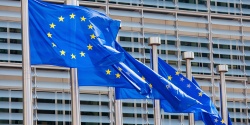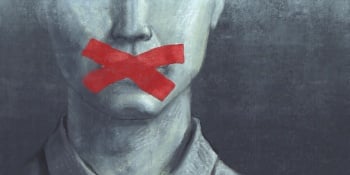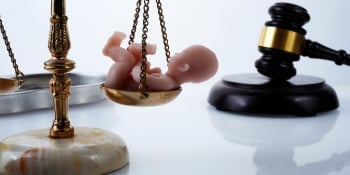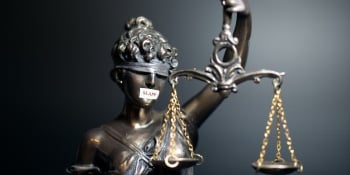Published: 13.09.2023

The President of the European Commission delivered her annual State of the Union address at the European Parliament in Brussels. Within the framework of the so-called "State of the Union," Ursula von der Leyen addressed the most important issues related to the current situation in the European Union, such as the European Green Deal, the economy, migration and Russian aggression against Ukraine. At the same time, Ursula von der Leyen stressed the need to further broaden and deepen integration within the European Union. The president also thanked efforts to deepen so-called gender equality and pointed to immigration as a solution to labor market problems.
Green Deal the most important issue in the Union
At the beginning of her address, the European Commission President noted that today's European Union reflects the vision of those for a better future after World War II, referring to European integration. The upcoming elections to the European Parliament will be the moment when voters will decide what kind of future and what kind of Europe they want.
The address itself focused on several key topics covering the most relevant problems, challenges and future projects. Among them, Ursula von der Leyen mentioned issues such as the European Green Deal, the economy, artificial intelligence and digitization, social affairs, migration issues or Russian aggression against Ukraine.
As the first and most important project, the President of the European Commission presented the European Green Deal, a set of initiatives aimed at achieving climate neutrality by 2050. The European Green Deal itself was presented as an answer to the call of history. In this context, Ursula von der Leyen recalled various natural disasters related to climate change. Among them, she mentioned the recent fires and floods in Greece and Spain or other negative weather phenomena taking place in many European Union countries, stating that "this is the reality of a boiling planet." The European Commission president also highlighted the economic aspects of the green transition, stressing that it was created as an opportunity to maintain future prosperity, also mentioning investment and innovation. At the same time, she pointed out that modernization and decarbonization can go hand in hand, and that the Commission will support European industry in this process. She cited wind energy as an example of European success in this matter, while stressing that some changes are needed in view of the new challenges. The President of the European Commission therefore announced the European Wind Power Package, which is to be based on cooperation with industry and member states and includes skills, financing and ensuring stable supply chains.
Immigration and gender
An important part of the address was the issue of migration. The European Commission president mentioned armed conflicts, climate change and instability as factors that force people to relocate and seek protection in other countries. Von der Leyen cited the new Pact on Migration and Asylum, which, in her view, is the result of work and a kind of golden mean between the need to protect borders and the need to protect people, between sovereignty and solidarity or between security and humanity. In doing so, the President of the European Commission mentioned the hybrid attack by Belarus on the Union's external border, while pointing out that European bodies should be strengthened to combat human trafficking and law enforcement.
During her speech, the President thanked the "groundbreaking and pioneering" work in the area of "gender equality," noting that it means a lot to her as a woman. Here she referred to the Directive on Women on Boards and the European Union's accession to the Istanbul Convention. In a further section of the address, she also cited the Directive on Equal Pay and Transparency of Remuneration and the Directive on Combating Violence Against Women. At the same time, Ursula von der Leyen said that the work to date on the matter in question is far from complete and, in her view, we must continue to move forward together.
Relations with China
Ursula von der Leyen also mentioned problems related to unfair competition. As an example, she cited unfair practices by China in the area of solar energy or the electric car sector. In the latter case, she accused the Chinese of undercutting the prices of these cars due to, among other things, state support and the resulting flooding of global markets with their products. The President therefore announced that the Commission is launching an anti-subsidy investigation into electric vehicles coming from China. During her address, she said at the same time that it is equally important, however, to keep the lines of communication and dialogue with China open.
- Europe is open to competition. Not for a race to the bottom. Reducing risks, but not stretching - this will be my approach in talks with Chinese leaders at the EU-China summit this year," Ursula von der Leyen said. With this, the European Union is entering a new phase of green transformation.
Later in her address, the European Commission President focused on issues relating to environmental protection, emphasizing the importance and richness of the environment in many different member states. She then turned her attention to the role of food security and self-sufficiency in this area, paying tribute to the farmers who provide food for Europeans every day through their work. In her view, the Union needs more dialogue and less polarization on agricultural issues. Therefore, Ursula von der Leyen noted that a strategic dialogue should be launched on the future of agriculture in the European Union.
Another theme of the address was issues related to the economy, social affairs and competitiveness. Among these issues, the European Commission President identified three challenges that Europe will face in the coming year. They are labor and skills shortages, inflation and making it easier for companies to do business.
Socio-economic issues
In the context of labor market problems, von der Leyen stressed the importance of the EU's NextGeneraton program, commonly known as the Recovery Fund, which is a response to the economic crisis caused by the COVID-19 pandemic. The chairwoman positively assessed the effects of this project, highlighting the increase in employment and shortages of appropriately skilled workers in a wide variety of industries, such as IT, healthcare and tourism. In her view, access to the labor market needs to be improved, which is especially true for young workers and women. In this connection, Europe also needs skilled immigration and appropriate and far-reaching changes in areas such as technology, society and demographics. Dialogue between the various social partners needs to be revisited, which is why a new Social Partners Summit will be convened next year in Val Duchesse, in reference to the earlier meetings and negotiations through which the process of European integration began after World War II.
Ursula von der Leyen highlighted the European Central Bank's efforts to keep inflation under control. She also mentioned energy-related problems, including Europe's dependence on Russian gas, which has been used by Vladimir Putin as a weapon in the context of Russian aggression against Ukraine. The European Commission president hailed the stabilization of gas energy prices and investments in renewable energy sources as successes.
As for the facilitation of doing business, Ursula von der Leyen noted that by the end of the year a new body will be established, the SME envoy, which will be tasked with informing the European Commission president about the most important problems of this group of entrepreneurs. Meanwhile, each new piece of European Union legislation will be analyzed from the point of view of competitiveness by an independent commission. In the coming months, legislative proposals will also be announced, aimed at reducing by 25% the number of information obligations imposed on companies. The Commission Chairwoman went on to mention the need to provide companies with access to key technologies, which requires joint funding at the European Union level. This refers to the European Commission's idea, proposed in June of this year, to create a Strategic Technology Platform for Europe (STEP). The need to secure access to strategic raw materials and materials was also mentioned during the address.
Later in the speech, Ursula von der Leyen addressed issues related to digitization and artificial intelligence. The President emphasized the importance of digital technologies, given that their development is associated with the emergence of new challenges, such as disinformation, the spread of harmful content or threats to the confidentiality of our data. In this aspect, she highlighted Europe's pioneering role in protecting citizens' rights in the digital world. In her view, Europe should lead global efforts to adopt a framework for artificial intelligence and based on protective barriers, governance and guiding innovation.
Further expansion of the EU?
Later, Ursula von der Leyen referred to Russian aggression against Ukraine, stressing that this country can rely on the European Union.- We will support Ukraine every step of the way," the president pointed out.
Von der Leyen also emphasized the European Union's efforts to help Ukrainian war refugees, as well as Ukraine itself. At the same time, she said, the future of Ukraine, like the future of Moldova and the Western Balkans, is in the European Union. In this context, she noted that each time the European Union has expanded, it has been and continues to be linked to deepening integration. Therefore, the next enlargement to new member states should be a catalyst for progress in this matter. In the longer term, it will also be necessary to amend the treaties.
Particularly noteworthy are the words of the President of the European Commission, spoken at the very beginning of the address, and referring to the upcoming elections to the European Parliament. As Ursula von der Leyen said, they will be an opportunity for voters to express their opinion about what kind of Europe they want.
These words could become crucial, especially if it turns out that in the new European Parliament, elected in the next elections, more seats will be won by groups advocating a reduction in European integration or even outright Eurosceptic parties, contesting the existing policies of the EU establishment. Such a possibility is highly likely, especially given pan-European trends.
Patryk Ignaszczak - analyst at the Ordo Iuris Center for International Law

19.04.2024
Although Russia exerts real and dangerous influence in the West, the traditional conservative Right is nevertheless being falsely accused of pro-Moscow activities. Among the methods most commonly used are:

19.04.2024
· A draft directive on combating violence against women is being discussed in the European Parliament.
· This draft may raise concerns due to its extremely broad definition of ‘violence’, as well as the government’s mandate to censor ‘offensive’ online content or its obligation to combat ‘harmful gender stereotypes’.
· The directive may also entail a restriction of the presumption of innocence in cases of sexual offences, by indirectly presuming a man’s guilt.

· The European Parliament adopted a resolution calling for the inclusion of the so-called right to abortion in the Charter of Fundamental Rights of the European Union.

22.03.2024
A few weeks ago the European Parliament adopted a directive on „protecting persons who engage in public participation from manifestly unfounded or abusive court proveedings” („strategic lawsuits against public participation” - SLAPP).